A tribute to Robert Parry, the founder and editor of Consortium News, was held in Berkeley last month. Here is the video of the event and excerpts from the speakers who celebrated Bob’s life.
By Rick Sterling
Event Photos by Bill Hackwell
A celebration and salute to the investigative journalist and publisher Robert Parry took place on Saturday, May 19 in Berkeley California.
You can watch a video shot by Raj Sahei of the entire event here.
Robert Parry was born in 1949 and died of pancreatic cancer in January 2018. From 1974 until the early 1990’s he worked as investigative journalist for Associated Press, Newsweek magazine and then PBS Frontline. During that time, he played a key role breaking stories on the illegal funding of the Nicaraguan Contras, CIA collusion with drug dealers, and Ronald Reagan election team negotiating with Iran to delaying the release of American hostages until after the 1980 election. Frustrated with the increasing difficulty of getting his research and findings published, Parry founded the investigative journal Consortium News, which continues to today.
Although Bob never became a household name, many readers will recall News stories he played a key role in bringing to public consciousness. He uncovered the “Iran-Contra scandal” where the US secretly sold weapons to Iran via Israel with profits supporting mercenary “Contras” attacking the Nicaraguan government. He uncovered Lt. Col. Oliver North secretly working at the Reagan White House to supervise support for the Contras. He exposed CIA collusion with criminals sending weapons to the Contras and receiving tons of cocaine on return flights from Colombia and Central America.
In 1988, Parry co-authored an article that documented CIA and State Department activities to misinform the public to promote the desired public policy.
Next, Parry worked with PBS Frontline to uncover the “October Surprise”. That story involved Ronald Reagan’s election team secretly delaying the release of American hostages held in Iran. These stories appeared in mainstream media but were ultimately swept under the carpet.
The CIA-Contra-Cocaine Connection
The story about CIA complicity with drug-dealers was especially explosive because of the impact of drugs in poor communities across the US. There was an epidemic of cheap crack cocaine flooding poor and especially African American communities.
Robert Parry originally reported the CIA-Contra-Cocaine story in the mid 1980’s. Ten years later, in 1996, investigative journalist Gary Webb uncovered what happened after the cocaine arrived in the U.S.: crack cocaine had flooded poor and African American communities, especially in California. The negative consequences were huge. The San Jose Mercury News published Gary Webb’s investigation as an explosive front page 3-day series titled “Dark Alliance”.
The story was initially ignored by the foreign policy and media establishment. But after two months of rising attention and outrage, especially in the African American community, a counter-attack was launched in the NY Times, Washington Post and LA Times. The LA Times alone assigned 17 reporters to what one reporter dubbed the “Get Gary Webb team”. They picked apart the story, picked apart Gary Webb’s personal life and distorted what he wrote. The attack succeeded. The Mercury News editors published a partial “correction” which was taken to apply to the whole story. Gary Webb was demoted and then “let go”. His reputation was destroyed and he ultimately committed suicide. An 2014 movie titled “Kill the Messenger”, made in consultation with Gary’s family and Bob Parry, depicts the events.
When the establishment media was going after Gary Webb, with the quiet encouragement of the CIA, many journalists were silent or joined the pack attack. Later, when an internal CIA investigation confirmed the veracity of Webb’s research and writing, they mostly ignored it. Robert Parry was one of the few national journalists to defend Gary Webb and his reporting from beginning to end.
At the Berkeley tribute, journalist Dennis Bernstein recalled being with Bob Parry and Gary Webb: “I remember the power that those guys had with audiences. It was easy to understand why people would be afraid of them. They were truth tellers.”
The Birth of Consortium News
As other western journalists were being pressured into compliance or driven out of the profession, Robert Parry chose a different path. Together with his oldest son Sam Parry, he launched the first investigative magazine on the internet: Consortium News. In his last article Bob Parry explained, “The point of Consortium News, which I founded in 1995, was to use the new medium of the modern internet to allow the old principles of journalism to have a new home, i.e., a place to pursue important facts and giving everyone a fair shake.”
For the past 23 years, Consortium News has published consistently high quality research and analysis on international issues. To give just a few examples: In March 1999, Bob Parry surveyed the dangers of the Russian economic collapse cheered on by Western neoconservatives while Mark Ames exposed the reality of Russian economic gangsters. In February 2003, Consortium News published the First Memorandum to the President by Veteran Intelligence Professionals for Sanity (VIPS) after Colin Powell addressed the UN Security Council. VIPS presciently warned of “catastrophic” consequences if the US attacked Iraq.
In 2005, Bob Parry exposed the bias and deception behind the rush to blame the Syrian government after Lebanese leader Rafik Hariri was assassinated. In April 2011, as the US was pushing to overthrow Qaddafi in Libya, Parry drew parallels to the disastrous consequences of overthrowing the socialist leaning Afghan government three decades earlier.
Beginning in 2014, Bob Parry exposed the dubious accusations regarding the downing of Malaysian Airlines MH-17 in Ukraine. Over the past two years, Bob Parry wrote and edited dozens of articles exposing the bias and lack of evidence behind “Russia-gate”. A few examples can be seen here.
Commitment to Facts and Objectivity
Sam and several other speakers at the Berkeley Tribute noted that Robert Parry was not ideological. He believed in following the leads and facts wherever they led. The new editor of Consortium News, Joe Lauria, said, “Bob was not a lefty radical… He didn’t start out from an ideological position or have a preconceived notion of what the story should be.”
Bob Parry’s investigations in the 1980’s revealed the U.S. administration plans and propaganda aiming to “glue black hats” on the Nicaraguan government and “white hats” on the Contra opposition. Thus he was well prepared to critically examine the disinformation campaigns accompanying “regime change” campaigns over the past decades: from Yugoslavia to Iraq, Libya, Syria, Ukraine and others.
Under Bob Parry’s leadership, Consortium News has exposed “fake News” at the highest levels. As journalist Norman Solomon said at the tribute, “It’s important to remember that the most dangerous fake News in the last few decades has come from the likes of the front page of the New York Times and Washington Post. There are a million dead Iraqis and many dead Americans to prove it.”
Challenging the New McCarthyism
In his last article, published just two weeks before his death, Parry informed Consortium News readers about his health issue. He speculated on possible contributing factors including “the unrelenting ugliness that has become Official Washington and national journalism.”
Parry described the decline in journalistic standards and objectivity.
“This perversion of principles – twisting information to fit a desired conclusion – became the modus vivendi of American politics and journalism. And those of us who insisted on defending journalistic principles of skepticism and even-handedness were increasingly shunned by our colleagues, a hostility that first emerged on the Right and among neoconservatives but eventually sucked in the progressive world as well…. The demonization of Russian President Vladimir Putin and Russia is just the most dangerous feature of this propaganda process – and this is where the neocons and the liberal interventionists most significantly come together. The US media approach to Russia is now virtually 100 percent propaganda.”
At the Berkeley event, writer Natylie Baldwin addressed this issue,
“Robert Parry referred to the phenomena of careerism and group think. He argued that it was ruining journalism …When our most experienced academic expert on Russia, Stephen Cohen, can hardly get an interview on CNN and cannot get an op-ed published by the New York Times or the Washington Post, but a neo-con ideologue like Michael Weiss, who has no on the ground experience or educational credentials about Russia can be hired as a commentator by CNN on the subject, it’s dangerous. When someone like Rachel Maddow, who from her past investigative reporting knows better, has allowed herself to be used as a cartoonish purveyor of anti Russia propaganda, virtually ignoring coverage of more immediate issues facing average Americans and distracting them away from confronting the Democratic Party’s failures and dishonesty, it’s dangerous.”
Baldwin elaborated on the current critical situation and need for honest and objective journalism. She said,
“Our media, like our political system, is in crisis. Indeed, these two crises reinforce each other as both our media and our political system are corrupted by money and have been largely reduced to a cheap spectacle. According to polls, large majorities of millennials have contempt for these establishment institutions. They’re open to and looking for alternatives to these broken systems. This makes Robert Parry’s legacy and the space for genuine investigative journalism that he fostered at Consortium News more important than ever.”
Reflections on Bob Parry
The event began with messages of respect and appreciation by Alicia Jrapko of ResumenLatinoAmericano and Ann Garrison of Black Agenda Report. Ann Wright, former US Army Colonel and State Dept official, sent a video message hailing Bob Parry as one of the “truth-tellers”.
Following are excerpts from major presentations at the event.
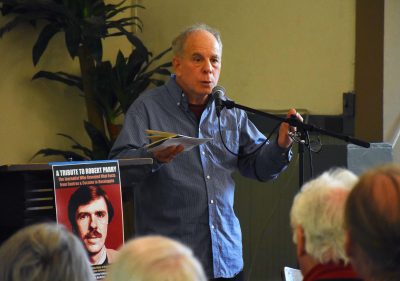 Dennis Bernstein, Executive Producer of Flashpoints Radio, gave the first presentation. Dennis talked about his experience teaching journalism to high school students in the Bronx in 1984. The importance of investigative journalism was underscored as Dennis’ students investigated the police killing of a 67 year old grandmother named Eleanor Bumpers.
Dennis Bernstein, Executive Producer of Flashpoints Radio, gave the first presentation. Dennis talked about his experience teaching journalism to high school students in the Bronx in 1984. The importance of investigative journalism was underscored as Dennis’ students investigated the police killing of a 67 year old grandmother named Eleanor Bumpers.
“Bob Parry was investigating Iran Contra and we were investigating the police in the South Bronx. Because those kids were so dogged with their cameras and with their questions, their investigation led led to one of the only indictments of a police officer for manslaughter in the history of the city. It was their investigation that counteracted the big lie of the press.”
Dennis later worked as a reporter for Newsday covering the trial in Tucson Arizona of nuns in the sanctuary movement. There was a ‘crazy colonel’ from the White House, Oliver North, who was screaming the that nuns were getting in the way of national security and US foreign policy in El Salvador.“We were hearing a story about how this Oliver North was in fact part of this prosecution of these nuns and priests and church workers… they were all convicted.”
“There was a meeting in Washington DC towards the end of 1985 … That’s where I met Robert Parry….I began to follow the work of Robert Parry. I began to understand what it took to be a thorough journalist.”
“Robert Parry was very special and you know, he rarely rejected pieces that I did, but when he did it was because he felt something wasn’t true in the piece. He worked very hard to explain it to me or try and rewrite the piece to save the piece, but he was incredibly patient, incredibly focused..And he was very funny. One Halloween he dressed up as the ghost of William Casey. You all remember William Casey? Yeah. Well, that story. Iran Contra, the US government engaged in cocaine operations. The idea that the US government could be, at least in part, responsible for the flood of horrific drugs into communities across the country. Later on, I had an incredible chance to be with Gary Webb, Robert Parry and Pete Brewton, who broke the story about how the CIA was using S&Ls after they were deregulated to fund all kinds of illegal operations.”
“I have a distinct memory of Bob trying to explain to Gary Webb who was riding high on breaking the Dark Alliance stories. He was convinced he had the full support of the leadership of the San Jose Mercury News. I remember Bob trying to caution Gary about how dangerous the story was and what could happen. Garry said he knew his editors were with him and that he had strong support. They were all cheering for Gary until the New York Times and Washington Post shredded him. Bob tried to warn him, tried to tell him.
But to be with them …. I remember the power that those guys – Bob, Gary Webb and Pete Brewton – had with audiences. It was easy to understand why people would be afraid of them. They were truth tellers. ….. They were under attack then and they’re under attack now. I am really troubled. I can’t tell you how much I miss Bob.”
“We lost them. We miss them. But Consortium News because of its power and as a tribute to Bob is continuing.
Thanks to its wonderful new editor, Joe Lauria, it continues. He’s beginning to transform it. He’s making his changes. He’s expanding it. Best part, he is bringing in some wonderful new writers that really enhance the work there. So I miss Bob, I miss him every day, but Consortium News continues and continues stronger than ever.”
Sam Parry, oldest son of Robert Parry, flew in from the east coast to attend and speak at the event.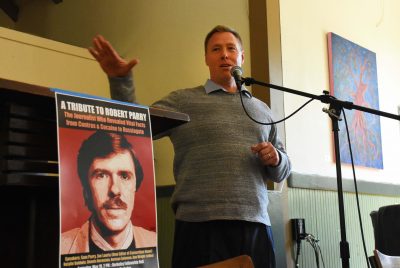
“Thanks very much. I’m so honored to be here and I feel the weight of sort of this incredible crowd and the weight of my father here and the legacy that he created with Consortium News. I’m just so grateful to have you all here and to be part of this event and to do my part, to represent the family, to represent dad here. I know dad was a very humble man in many ways. He never wanted the limelight or the attention shown too brightly on him. He wanted the work to speak for itself, so I know part of him would be a little embarrassed by this great turnout, but another part of him, I know he’s smiling. I can feel the smile on his face right now as I look out onto you all. So thank you all very much for coming out and thank you.”
Dad chose a very difficult profession. Journalism is hard work. You’re fighting to get the stories. You’re fighting to get the truth. You have to write it down, you have to edit it, you have to make sure you’re correct all the time. Dad always felt that he couldn’t make a single mistake because if he did, they’d come after him even harder. So he worked really hard to get it all right. And he took a difficult path with his profession. He took on the mainstream as so many of you all have done with your careers as well, but he took on the mainstream. He was part of the mainstream and then he sort of had to confront them and fight for all the stories that he was able to bring forward.
And in doing so, he made himself sort of a target of, of retribution and attacks. And so he was attacked all the time. Every day by big, powerful institutions and big powerful people. He took it, but he took it because he had a community of supporters and like minded individuals, people who understood the importance of telling the truth and speaking truth to power and that community of people are people just like you. You were his community, you were his, in many ways, his family, like minded travelers in this world.
I especially want to thank you all for being supporters of his, of his website, Consortium News.com and for coming out today, and this is just so beautiful.”
Sam described the early years of Consortium News. It began as a print publication: hand collated, stamped and mailed. At college Sam had learned about the burgeoning new “internet”. When Bob discovered original documents proving the October surprise, Sam suggested they could scan the documents and post them for people to see online. Bob responded, “That’s an interesting idea”…. and thus was born the online Consortium News.
“We didn’t know what the heck we were doing in a lot of ways! We had dad’s great journalism of course, but the rest of it we had to figure out as we went along….. Dad worked at this website for the next 23 years. Every single day he was tinkering away at it. He was gathering stories from many of you here in the room, and editing the stories, working with contributors to keep our truth alive. He felt so passionately about that….
Something I wanted to share today is that dad was a patriot. I think that he really loved America. He loved our ideals, he loved the people, he loved the idea of holding the institutions that govern us accountable. Right? And that was his passion. That was what he was all about and that’s what really drove him and propelled him through his life.
We’re going to see a video of his life and hopefully you all will enjoy this and maybe it’ll bring him to life a little bit more for you all. Thank you for being here.” [This 10 minute video can be seen at 1:03:00 of the April Memorial Service video. ]
Natylie Baldwin is a Consortium News contributor and co-author of the book “Ukraine: Zbig’s Grand Chessboard: How the West was Checkmated”. She said,
“I’d like to thank everyone for coming out today. I’d like to thank the organizers for inviting me to speak at a tribute to a man who was very inspirational to me. My own interest in foreign affairs began in college not long after I graduated, 9-11 happened. I joined the local peace movement to oppose our wars and it didn’t take long for me to realize that the media is a big part of the problem.
“The Myth we’re taught is that our democracy is underpinned by a media that serves as a watchdog on the government and other powerful institutions, a noble fourth estate. But when it comes to issues of war and the media, rarely if ever has the media served as a questioner of government claims, performing due diligence on a matter of life, death and destruction of societies. We saw the mainstream media’s gross negligence with Iraq, Libya, and other examples stretching much further back.
“We are now seeing the same thing happened with the world’s other nuclear superpower, Russia. I grew increasingly concerned about the degree of recklessness by US political elites who supported the coup in Kiev, completely disregarding Russia’s security interests on its border.
“I began to dig deeper into post-Soviet Russia and US- Russia relations. I realized just how distorted and lacking in context the narrative Americans were being given, was during this time. One of the sources I relied on among others was Robert Parry and Consortium News. I also connected up with Sharon Tennyson, an independent writer and program coordinator with over three decades of experience on the ground all over Russia, including citizen to citizen diplomacy during Cold War One. She became my mentor and we traveled to Russia in October of 2015 for two weeks where I was able to speak to a cross section of Russians in several different cities on a range of issues.
“We traveled to Crimea where I interviewed a range of Crimeans about what happened in late 2013 in early 2014. At this point, I had researched and co-authored a book about the Ukraine crisis providing historical and contextual background of US-Russia relations as well as writing articles for a couple of alternative outlets.
“I tried submitting articles about my on-the-ground observations and interviews in Crimea to several other alternative outlets in the hopes of getting this information out to a wider audience. After all, not many American writers had actually been to Crimea and could provide on-the-ground perspectives.
“I was having little luck. Somehow I got hold of Robert Parry’s email address and submitted it to him. Within 48 hours my article was posted with many others to follow. I was even more pleasantly surprised when a couple of weeks later I received a check in the mail for my work. That is a big deal for independent writers these days.
“The money I earned from my articles for Consortium helped finance a return trip to Russia in 2017 and more articles. Bob said that journalism required the acknowledgement that there were usually two sides and possibly more to every story and that Americans needed to hear both sides. It’s critical to have an informed citizenry with a reasonable understanding of issues in a democracy. This is especially true with issues that most average Americans don’t have practical experience with, such as international policies relating to other countries. In order to conduct a rational foreign policy, one must understand the other country’s point of view. It doesn’t mean one must agree with it, but we must know how the other side perceives its own interests so that we can determine what they may be willing to risk or sacrifice on behalf of those perceived interests. Further, it’s essential to determine areas of common interest in cooperation.
“Our media, like our political system, is in crisis. Indeed, these two crises reinforce each other as both our media and our political system are corrupted by money and have been largely reduced to a cheap spectacle. According to polls, large majorities of millennials have contempt for these establishment institutions. They’re open to and looking for alternatives to these broken systems. This makes Robert Parry’s legacy and the space for genuine investigative journalism that he fostered at Consortium News more important than ever with strong leadership and a continued quality of long form journalism from its current and new contributors, we can make a much needed difference at this critical time. Thank you.”
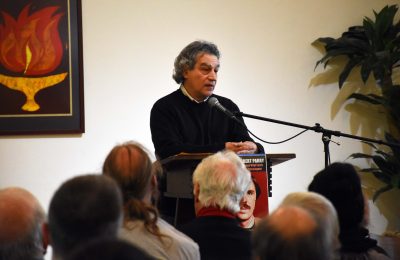 Joe Lauria has been a contributing writer to Consortium News for many years. He was recently hired to become the site’s new Editor-in-Chief. He spoke about the legacy of Bob Parry and his plans to continue and expand Consortium News.
Joe Lauria has been a contributing writer to Consortium News for many years. He was recently hired to become the site’s new Editor-in-Chief. He spoke about the legacy of Bob Parry and his plans to continue and expand Consortium News.
“Bob was not a lefty radical…. He was just reporting the facts and where they lead. … He didn’t start off from an ideological position. He didn’t have a preconceived notion of what the story should be.”
“This is an age of narcissism, not only in the White House, but across the social media landscape. Self promotion is widespread in media. But that was not what Bob Parry was about. He was obsessed, but not with himself whatsoever, but with the story and getting the facts out and holding government accountable….In one C-Span interview he says that that when you hold government to account, it’s misunderstood as anti-Americanism. I think he was very pro American as Sam pointed out… He was a patriot because he believed in the people of this country, not the government, and believed in holding them to account.
“I was covering the lead up to the invasion of Iraq at the UN Security Council. I was just reporting the facts and the facts were that even US allies such as France and Germany joined with Russia and China to block the resolution that the US administration, George W Bush’s administration, was seeking. They had made up their minds to invade anyway. They were going through the motions at the Security Council, seeing if they can get this resolution and if they couldn’t, they were going to do it anyway.
So I wrote these stories for a Canadian chain which was called Southam News. They published the Montreal Gazette, Ottawa citizen, Calgary Herald and Vancouver Sun. I had been writing for them for since 1999. But I got a call one day from the foreign editor of this chain and he told me that his son was a Marine, a Canadian Marine, and that I had to support the war and that my reporting was not supporting the war. I said to him I’m sure you are proud of your son, but that’s not my job. My job is to report what’s going on about the opposition to this resolution. They never got the resolution, but they got their war.
“Bob was a skeptic, but not a cynic. And there’s a big difference there. And you know, he really believed in a nonpartisan principled approach to journalism. And we’re living in such a partisan age right now, and you could feel it in the air in Washington where I’m now living, and he had no time for that.
Even if you’re an American citizen, when you become a reporter, you’re not reporting as an American citizen, you’re a reporter and all countries in a complex international crisis need to be equally reported on to let the reader know what each country’s interests are, because it is interests that motivate governments when nations clash.
That’s tremendous drama for journalism to report on. But instead of letting the reader understand the complexities of these situations the established media say one side is right and portray all the sides as the enemy. It became clear to me that when I worked at the Wall Street Journal that the corporate media does not have this objective view of international reporting. They’re promoting an American agenda abroad. That is not journalism. That’s not their job, and when you do that, when you suppress the voices of Iranians and Palestinians and Russians and North Koreans, you are dehumanizing these people and that makes it easier to go to war against them.
The American public doesn’t get to understand or know anything about Palestinians as people who were just slaughtered at the gates of Gaza.
Bob Parry knew that and he got slammed for that. But we’re all very thankful that he started Consortium News because he understood the power of the press is distinct from the power of government.
Too many reporters live vicariously through the power of government. They want that kind of power. So they suck up to it. They want access of course, but they sort of identify with the powerful rather than what the people. They’re supposed to be the filter between the government and the people. Bob Understood that there’s three parties here, there’s government, there’s the press and there’s the public and we’re supposed to be in the middle protecting the public from the lies of government. We are not seeing that now, but this is what I’m committed to try to continue doing at Consortium News.
I was asked to talk about the future of Consortium News. So I’ve been there six weeks now and it’s an enormous responsibility. I am extremely grateful to the board for hiring me, to have faith in me to do this job. I’m well aware that it’s impossible to try to do it as Parry did. I’m not trying to do that. I’m doing what I can do.
I’ve changed the appearance here or there to spruce it up, as Dennis said, and also to have more diverse voices in the paper. For example, Margaret Kimberly of Black Agenda Report wrote a wonderful piece for us on the 50th anniversary of Martin Luther King’s assassination. I’m looking to get correspondents in various countries around the world. We need Middle Eastern Arabs to write about their countries. I want more people from around the world writing about their own countries in their own voices. We have recently published Asad Abu Khalil – the Lebanese “Angry Arab” blogger who knows the region extremely well, better than almost any Western analyst could. So those are the kinds of voices I’m trying to bring.
I’m trying to revive a field of reporting that was very well established for decades in the United States and that has disappeared and that is labor reporting. I understand the unions have shrunk but even where unions don’t exist, workers exist. So we’re going to cover workers and the issues that they’re facing. I’m looking for more stories on the struggles of women in Africa, the Middle East and India and how they are struggling for their rights.
I just want to thank everybody for being here today. Thank you.
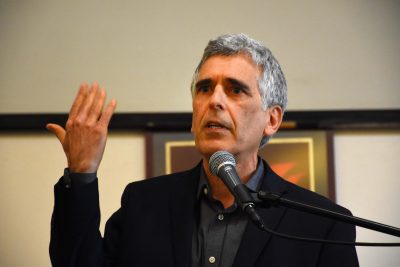
Norman Solomon is a well-known author and journalist. He spoke of his experience with Bob and his legacy.
“Hearing the discussion a few minutes ago about fake news, it’s so important to remember that the most dangerous fake news in the last few decades resulted in a million or more dead Iraqis and many dead Americans. The most dangerous fake news has come from the likes of the front page of The New York Times and the Washington Post. That’s just a reality. It’s not about ideology or rhetoric it is just cold, hard life and death fact.
Bob was somebody who had not only the curiosity that was constant to try to find out more, but also a tremendous work ethic. It was just part of who he was. I had the very good fortune to work with him on a series of articles about Colin Powell. Bob and I worked on a series of articles that are still archived on Consortium, about Powell. The more we looked into it, the more we saw the tremendous gap between the positive coverage and that from the beginning of his career in Vietnam, Powell always took that expedient path, the expedient way of getting along to get along with the powerful who could give him promotions. In working with Bob, a couple of aspects have always stayed with me very strongly. One is that he would frequently say as we were trying to go through material, that I have to master the information. I have to master the material….He was very insistent. You know, it’s sort of like you don’t pull it out of the oven before it’s baked. We can’t rush these stories. We’ve got to know that it’s nailed down and solid and we’ve really dug. And the other aspect I remember is how generous he was on a professional basis. In this multipart series that we did, Bob ended up doing the vast amount of the work but he insisted my name by on every article byline. Sad to say that’s not that common.
Bob was not about his name in lights. It was about, “Let’s get the work done.”
Norman described how Bob was aware of the areas that mainstream journalists shouldn’t touch, but he went there regardless.
“Almost all mainline journalists obey that unspoken directive that is accepted, internalized: Don’t go there. And Bob went there and he went there again and again. As his book “Fooling America” points out, he had to so to speak, pay a price. I remember him telling me a number of years ago when he was hammering on the Israeli role in US foreign policy and then writing about Russia, one of his colleagues, top colleagues, somebody who was in the press corps in DC who was a high editor at that point at the New York Times, said to him, ‘Bob, you’re you’re losing credibility. You keep this up. You’re going to marginalize yourself.’ But Bob had crossed that Rubicon a longtime earlier.
Norman spoke of previous fearless American journalists like George Seldes and IF Stone.
Bob Parry exemplified the attitude of: show me. I’m not going to assume that this is truthful because I might have a favorable view of this government or might assume that because other journalists are reporting it, it is received wisdom, I’m not going to take any of that on faith. If you want to go on faith, go to a house of worship.
One day toward the end of December I looked at Consortium News and saw that Bob had suffered a stroke. Then, a number of days later, there was an article by Bob. As I read it, there was a tremendous wave of feeling that it was, what’s the French word, a cri de coeur. I later learned how extremely difficult it was just physiologically for Bob to write it.
It’s one of the greatest articles about journalism I have ever read. My friend and often collaborator on articles, Jeff Cohen, said to me ‘That article by Bob Parry should be assigned and read by every journalism student in America.’ It’s about independent journalism. It’s about the herd mentality that has gotten to so many journalists in this country. Pseudo journalists, supposedly journalists, and editors run with the crowd and independent journalism is the opposite of running with the crowd. It’s about holding that lantern high and saying, we have work to do and let’s do it together. Thank you.”
At the end of the event, participants purchased copies of Robert Parry’s books “Fooling America” (1992),“Lost History: Contras, Cocaine,The Press & Project Truth” (1999), and “America’s Stolen Narrative: From Washington and Madison to Nixon, Reagan and the Bushes to Barack Obama”(2012).
….………..
Rick Sterling is an investigative journalist based in the San Francisco Bay Area. He can be contacted at [email protected]


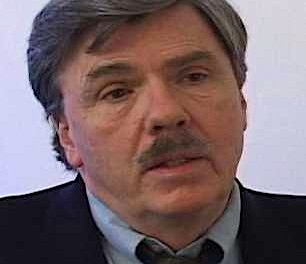
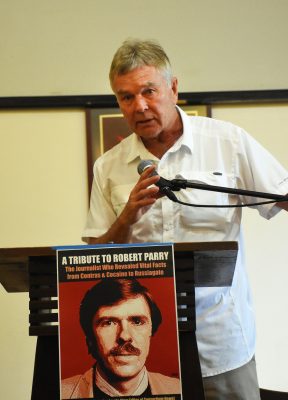
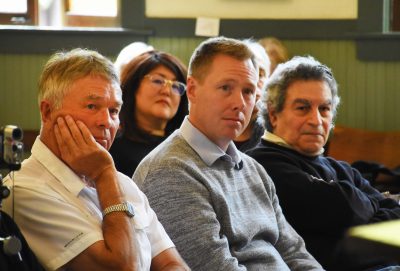
Viva Consortium News!
We were honored that this tribute was in the historic BFUU Hall and grateful that it was recorded so we can watch it again.
I was there, with my wife who learned much I had telling her about Bob’s life’s work confirmed. I too, miss his writing, by which I always felt I knew him, a lot. Thanks to those at Consortium News who continue to carry the torch.
Thank you so much for providing this very beautiful tribute for all of us who couldn’t attend.
I wish I could have attended too. I live in San Francisco but I was in Denver, Colorado when this tribute was held.
Robert Parry was indeed the I.F. Stone of our time. His work, his fluid, descriptive, colorful writing style and devotion to the true tenets of independent journalism will be sorely missed. I identify closely with his brand of nonpartisan, principled patriotism that places the people of his country and their right to know well above the government and their secretive policies.
I will regret not be able to read his articles on Consortiumnews but I hope Consortiumnews will continue to be a place where people who want to learn can learn and continue to be a place where the powers-that-be fear what they will learn.
In Truth,
Eric E. Johansson
Ex-US Army Paratrooper and Infantryman
Veterans for Peace, Chapter 69
San Francisco, CA
Thank you for putting this together. And of course, condolences for Robert’s family and friends. Keep shining the light…
I wish I could have attended. What a fantastic celebration of Mr. Parry’s life and work.
I can’t believe consortium is describing Gary Webb’s death as a suicide, there are YouTube videos of Gary Webb’s brother saying that Gary said he thought he was going to be killed and if he was it would likely be called a suicide. The man was working on his next book at the time of his death the records of which have magically disappeared, kind of like the white water papers in the Edward R Morrow building, go figure.
Thank you Rick Sterling for this great article, and thank you Joe Lauria for taking the helm at Consortium News and doing such a good job of honoring Bob’s memory by keeping the tradition of exceptional journalism alive.
I’m deeply grateful to Sam Parry especially for sharing the intimate personal moments his family had with his Father.
Like many others at this site, I had come to know and trust Robert Parry through his exquisite reporting. Once one became aware of him and his Consortiumnews site, you could not ignore him and his thorough reporting. I’m pleased to say that Joe Lauria is continuing the tradition.
I attended this Forum and was impressed with the literary celebrity attending. Over time, while acquainting one’s self with the research on the Assassinations of the Sixties one cannot help but become impressed by the researchers and reporters that have dedicated their lives to the Truth in Reporting. I think of Jim Garrison, Fletcher Prouty, Mark Lane, William Pepper, Peter Dale Scott, David Lifton, Joan Mellon, Lisa Pease and Jim Di Eugenio and so many others who have worked so diligently, and for many years, painfully gathered the data countering the official narrative. But it was only when I saw the home movies that Sam presented of the very deep affection that the Parry family shared, that I realized the truly deep commitment that real reporting takes. It’s not an easy thing balancing life with honesty, it is difficult and rare, yet Robert Parry mastered both Family and Reporting. Overall, an amazing feat.
Many Thanks…
I miss Robert Parry’s writing everyday I read. Bob I’m attaching this to your comment, because yours words reflect the most to how I feel. Joe
Thank you Joe.
Good citizens seek justice for all, which can seldom be had without truth. The soul that lives on is the historical meaning of our lives, seldom far from that of our era, and what we did to improve it. Robert Parry and Consortium have provided not only real journalism but community and courage for those who seek to correct the corruption inherent in society and government. They are the immortals, obscure in life but the builders of a better future.
thanks
hi, I so miss Robert Parry. Note I was a journalism student UW-Milwaukee 1982-1987, never graduated, but one of my profs was from Berkeley. Imagine that. He Artie Sieger as I remember his name, introduced me to IF Stone which led me to others. You do not have to be a degreed person to know what is right, and what is not right. I loved his advice, ” If your mother tells you she loves you, check it out , and check again, and check it one more time before you print it’.
Mr. Robert Parry, you are an immortal in your profession, and Consortiumnews lives on.
I am so glad they did this for Bob. One on the east coast and one on the west coast. In my opinion they should have been televised on C SPAN. Bob Parry–not Woodward, not Hersh, not Carl Bernstein, for sure not Amy Goodman–was the leading journalist of the era. That is from the late nineties, to the time of his death.
Unlike Amy Goodman, who talks about not being afraid to go anywhere, Bob really was not afraid to go anywhere The first article I ever sent to him was a negative review of Clint Eastwood’s film J. Edgar. Salon had turned it down. I sent it to Bob, he asked me about one sentence in it. He then posted it. And that was the beginning of a seven year relationship with the best editor I ever had.
Bob did everything he could to help and further Gary Webb’s bombshell series. I saw them both in Santa Monica at the late, great Midnight Special bookstore. Gary felt pretty good that night, he had a big supportive crowd. As me and my friend left, I said, “He doesn’t know it yet, but what happened to Jim Garrison, and Richard Sprague is going to happen to him.” Like the JFK and MLK cases, the CIA and drugs is a no no for the Power Elite.
I really hope that Joe can keep this site up. Its a real outlet of sanity in a media world that has gotten pretty much worthless. I agree, when Steve Cohen cannot get on the air, something is wrong.